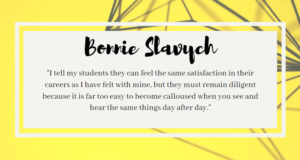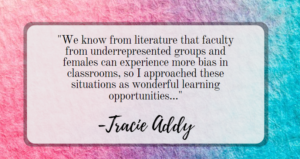
The Four Agreements in Academia
While I have read the book The Four Agreements five times, I had not perused this book since I accepted a professorship in 2012. When

While I have read the book The Four Agreements five times, I had not perused this book since I accepted a professorship in 2012. When

*Editor’s note: Every so often we like to give Faculty Focus readers an inside look into The Teaching Professor. The following article was recently featured

The life of a faculty member is filled with noisy busyness—planning class sessions, grading, meeting with students, advising, committee work, research, scholarship, and publications. We

This month’s The Focus is You features Bonnie Slavych, PhD, assistant professor of Communication Disorders at the University of Central Missouri. After Slavych’s first semester

One of the most intriguing, and perhaps intimidating, aspects of walking into a class for the first time and introducing yourself is deciding who you

In this week’s, The Focus is You, we chatted with Adam Arenson, PhD, associate professor of History at Manhattan College and director of the Urban

This week on The Focus is You, we’re learning a bit more about Tracie Addy, PhD, MPhil, Director of the Center for the Integration of

Have you ever become so frustrated with students and overwhelmed by your workload that you start questioning what you are doing? At times it can feel suffocating. Baruti Kafele, an educator and motivational speaker offers a perspective of being mission oriented to educators and others working with young people in our nation’s classrooms. He suggests affirming your goals and motivations to facilitate successes among students. However, in the college classroom, it is also essential that we, as faculty members, remember and affirm our purpose, acknowledge the contributions we make in students’ lives and professional pursuits, and respect the call or passion that brought each of us to the teaching profession.

Those who write about teaching persona (the slice of our identities that constitutes the “public teaching self”) encourage us to start by reflecting on the messages we want to send to students. A dialogue with ourselves is a useful beginning, but for the last days of a semester another option might be more intriguing and revealing.

We begin each semester on a different note than we end on. The early weeks hold promise and high hopes, both often curtailed when the first assignments are graded. The final weeks find us somewhere between being reluctant or relieved to see a class move on. There is an inexplicable but evident interaction between our teaching persona and the persona a class develops throughout a semester. Some structural factors influence both: among them—the type and level of a course, the discipline, the time of day, and whether the students are a cohort or a unique collection of individuals.
Get exclusive access to programs, reports, podcast episodes, articles, and more!